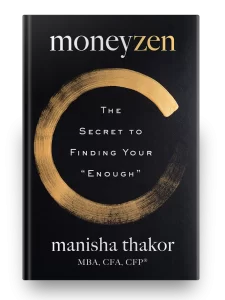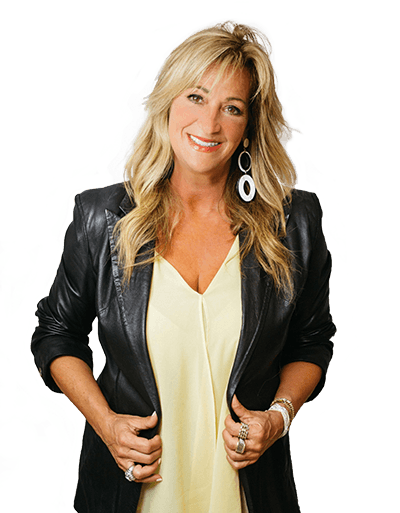Harvard MBA and Financial Wellness Expert Manisha Thakor is an awesome financial advisor. I met her years ago and never forgot how genuine and passionate she was about helping people understand their finances.

She was compelled to figure out how to help people unlock the secret to finding their ‘enough’ with respect to money, and she candidly shares her own journey out of the Cult of Never Enough. A painful mindset she explains, that tells you the money you earn, the accomplishments you achieve, and praise you receive is always insufficient.

Her new book is called “MoneyZen – The Secret to Finding Your Enough”, written with investigative journalist Lisa Sweetingham, sets out to understand ‘why’ so many of us develop toxic relationships around work, money and success at the expense of our emotional well-being and crucially, how to flip the mental script.
Here’s an excerpt from our podcast conversation relevant to that point.
Debbie: “You know, the Internet and social media and with everything in our face, it seems that the loudest message that keeps getting put out there is all about billionaires and influencers. And it seems like all these other people have figured it out. Are you hearing that?
Manisha: Oh, my God. Yes. It’s like we’re all looking at these crazy curated images. came out last week. Fidelity announced that the number of people with a million dollars in their retirement accounts had increased by 25%. I was talking to a girlfriend of mine who’s worked in financial services for 35 years, has an award in MBA, and she’s like, oh my God, I feel like sh*t. I don’t have a million dollars in my retirement account and look at all that I’ve done. And what I was saying to her was, yeah, the headline is just half the story. Did you look at the percent of account owners that it was? It’s only 1.6% of Fidelity’s entire account base. And so, yeah, if you have four millionaires and one more person comes, you got a 25% increase. So, it’s not like the whole world got a million bucks in there. I mean, we’re talking about 98.5% don’t and 1.5% do. And that’s what happens to us. Yes, we don’t get the whole message. We just get the headline and then we feel like crap, and we shouldn’t.”
There’s a money-happiness paradox. Yes, making more money can lead to greater life satisfaction, but it only works if you already possess emotional well-being she says.
Manisha wrote MoneyZen to share the powerful blueprint she developed on that journey one that can be used by anyone of any age income or profession, to stop surviving as a human doing and start thriving as a human being.

There are lots of inspiring stories in the book from people who share their experiences escaping the Cult of Never Enough. And women should especially benefit from reading the book as Manisha has always had a sweet spot for helping women and she knows how to make understanding investing simple!

MoneyZen, says Manisha, is for anyone who needs to let go of their self-sabotaging behaviors preventing them from living the life that makes their heart sing.
Meet Manisha Thakor in this podcast of our live conversation on The Debbie Nigro Show. BTW: you can listen to the show live from anywhere 11-12noon ET at WGCH.com
More about Manisha’s background at moneyzen.com

AUDIO TRANSCRIPT
0:00:00
And now, back to the Debbie Nigro Show.
3
0:00:03
Okay, look inside your heart and then you can take a peek inside your wallet. Does it match? Is it what you’re feeling you need and what you need? Can you, have it? Do you have enough? Hi everybody, I’m Debbie Nigro. I’m going to do a little sidebar quick and introduce you to my next guest because I just love her. I let her talk today more than me.
2
0:00:23
Manisha Thakor, author of Money’s End, The Secret to Finding Your Enough, was really talking about the people out there who seemingly never think they have enough and how it’s like sort of self-destructive behavior that harms your mental and physical health. So, we want to make sure everybody is emotionally healthy instead of being trapped in their own crazy thoughts. Hey, Manisha, what’s going on, girlfriend? It’s me. Oh, I’m so excited to hear your voice. I’m trying to think how far back it was that I met you. I’m sure it was in the 90s and I said to everybody, when I first met you, you were a young, brilliant financial brain. I always thought I would trust her with money questions and money advice. Now fast forward for the last 25 years, you’ve been working in the financial services industry, a lot of degrees. I know you went to Wellesley and Harvard Business School and worked at a lot of top money management firms, but I love that you’ve changed or actually steered your focus to financially empowering women and families by kind of making it easy to understand, easy to invest and easy to act. So congratulations to you.
1
0:01:52
Thank you so much, Debbie. I only wish that all those activities had come along with fewer gray hairs.
2
0:02:00
Well, no, no, it doesn’t come without gray hairs. You have to get in it, get beat up and then go, oh, I wish I knew that. Let me tell these people what I know that they save them some trouble, right?
1
0:02:11
Well, I absolutely did some face plants, which I very honestly and authentically and wrongly share in the book because it’s my deepest hope to help people not go through the same inky quicksand that I went through.
2
0:02:25
You know, one thing you’ve put on your website that I’ve never saw anybody do which I was so attracted to, was your authentic description of who you are as a professional as a woman you know good bad and ugly and I just thought that was really telling about who you are as an authentic person. What reaction have you gotten to sharing all that personal stuff?
1
0:02:53
You know, Debbie, it’s funny. When I first started doing it, I would have people say to me, like, you can’t say on your website that you’re bipolar too. You can’t tell people that you struggle with self-confidence and self-esteem and binge eating and body image issues. You can’t put that out there and be successful in the financial world. But what I found is, well, I am all those things. And so are so many other people, and not those things, you know, other kinds of similarly painful things we struggle with. And ultimately what I found is that it helps me connect with people on such a different level, because I’m not pretending to be somebody I’m not. And that encourages them not to pretend to be somebody they’re not, and then we’re both happier.
2
0:03:39
Right, so like you think financial advisors straight up, straight, you know, kind of straight and narrow, book smart, you know, money smart, no flaws, like I should listen to them. So, I think that you opened up a really wonderful discussion by saying, hey, you know, I’m a Leo, here’s my guilty pleasures, here’s my inspiration, here’s what brings me joy, here’s what I’ve struggled with, you know, here’s my beverage of choice and I’d like to have a choice between a strong cappuccino and a big cabernet. What is new about this book information-wise that you have took all
1
0:04:30
this time to get to in your life to share? What this book is is a better living blueprint for anybody who has ever felt that no matter how much they earn, how many accomplishments they achieve, how much praise they receive, it’s just never enough because as in my case it just felt like I was never enough. It’s also about people who feel that they have succumbed to society’s toxic message that the answer to virtually anything that ails us is more. Find more, do more, have more. And so this book is a formulaic roadmap that can help people of any income, profession, age, ethnicity find money then by learning to focus their energy smartly on both building financial health but also emotional wealth.
2
0:05:30
Yeah, because when you talk about money and the connection with happiness and emotion, we all know and have heard multiple times that people will take a job, for example, getting paid less because they’re happier there and have given up working for companies where they could make money or moving to have a better career because they wouldn’t be as happy. So it’s about being happy and knowing what that is for each of us. You talked about this group of people who it’s never enough. You call them almost a cult. You said the cult of never enough. How big is that cult?
1
0:06:05
Honestly, Debbie, I feel like probably 75 or 80% of adults are in it because it’s in the air. There are cultural norms and societal influences that pull all of us towards it. Talk about those in the book. And then if you’ve had the gateway drug into it, which is what I call a small T trauma, anything that happened to you before the age of 25 that maybe made you feel like you’ve got to prove yourself, show you’re enough. In my case, it was getting bullied as a kid. And that’s how I think about it.
2
0:06:48
Got it. You know, the Internet and social media and everything in our face, it seems that the loudest message that keeps getting put out there is like, oh, billionaires and influencers. And it seems like all these other people have figured it out. Are you hearing that? Oh, my God. Yes. It’s like we’re all looking at these crazy curated images. came out last week. Fidelity announced that the number of people.
1
0:07:03
with a million dollars in their retirement accounts had increased by 25%. I was talking to a girlfriend of mine who’s worked in financial services for 35 years, has an award in MBA, and she’s like, oh my God, I feel like shit. I don’t have a million dollars in my retirement account and look at all that I’ve done. And what I was saying to her was, yeah, the headline is just half the story. Did you look at the percent of account owners that it was? It’s only 1.6% of Fidelity’s entire account base. And so, yeah, if you have four millionaires and one more person comes, you got a 25% increase. So, it’s not like the whole world got a million bucks in there. I mean, we’re talking about 98.5% don’t and 1.5% do. And that’s what happens to us. Yes, we don’t get the whole message. We just get the headline and then we feel like crap, and we shouldn’t.
2
0:08:18
And I think that it’s a bigger story how little people have in their accounts. I was just saying earlier, I was reading about the millennials and that they’re all turning like 40 plus now, so we thought they were kids and now they’re not. The average median cash somebody between 35 and 44 has in their bank account, I read, is $4,710, a median of $60,000 in their retirement account. Unfortunately, the saddest group are many women who are in their golden years with no retirement funds. Are you seeing that?
1
0:08:54
I absolutely am and there are a variety of different factors for it. One of the things that I talk about in the book that can be really useful is something I refer to as joy-based spending and it is a way to reframe budgeting to find money that you are leaking in places of your life that aren’t bringing you joy so that when you eliminate those expenses, you’re not eliminating any joy, but you are freeing up money that can be used to help build up those retirement accounts or those bank accounts. And so that process can be very powerful for the spending for anybody who feels like they mathematically need to have bigger numbers in either of those buckets. And let’s be honest, that’s part of financial health.
0:10:05
than people might expect it would be. Did you spend a lot of time on that? In the book, I do not go into extreme depth on this topic. I have in my other two books that I have written. What I would say about investing is for most people, you don’t need to pick the hot stock. You don’t need to be watching the market go up and down. What you just need to do is buy a simple investment called a target date retirement fund based on underlying index funds and over time it’s like the chicken rotisserie set and forget it you own bits and pieces of companies across the globe. And the bigger issue within investing that I talk about is more so how do we shift our lives to free up the money we need so we can find some money to invest. And that really gets to the core of the financial health piece. And so that’s what I focus on in the book from the financial standpoint. This book is about financial worry as opposed to financial problems, which are solved by very specific answers. My credit score is low, how do I raise it? Financial problems. I’m terrified I’m gonna be a bad lady under the bridge. Money, worry, solved with an emotional and intellectual answer. And that’s what this book is about.
2
0:11:29
How long did it take you to write it, Manisha?
5
0:11:32
How long did it take you to write it?
4
0:11:33
I’m sorry, I talked over you.
1
0:11:34
I’m laughing. It took me two and a half years of research.
2
0:11:42
Why are you laughing? That’s like short. It takes forever to write a book. And when you finally get one done and get a cover and get it printed and get it out there and then promote it, it’s a forever lead up to something that you’ve been living, eating, and breathing since you wrote it. Are you proud of it being out there? And what’s the reaction you’re getting? I’m proud of you. I’m happy to have you, I know you’re special, and I’m happy to give you, my platform. So, are you having the reaction you’d hoped?
1
0:12:07
People who read the book, Debbie, it has been life-altering. I cannot tell you how many women have read it and reached out to me to say, oh my God, I thought I was the only one. And not only did you not make me feel alone, but you also gave me a road map to get out of this place and to finally feel calm, confidence and clarity about the role of money and my relationship to money. And that’s what Money Zen is all about.
2
0:12:36
Oh, you did a good job. Gave people a road map to get out of that place. Manisha Thakur, so nice to have you. I’ll leave you with her comment on our website. We don’t need more financial information. We need financial wisdom to help us redefine our relationship to money and create lives in alignment with our deepest values. And she calls this Money Zen. Her new book can be found at MoneyZen.com. And I wish you all the best of everything. I’m so happy you’re on my show today and I’m privileged to know you, Manisha.
1
0:13:06
Maybe I’m sending you a big karmic hug.
2
0:13:09
Okay, I’ll take it. Thanks so much. Have a great rest of your day.
4
0:13:13
You too.
2
0:13:14
Okay, I hope everybody buys her book. She really does figure out how to make it simple and there’s an answer there for those who need it. an answer there for those who need it. Come on back one more story on the Debbie Nigro show.
Transcribed with Cockatoo


